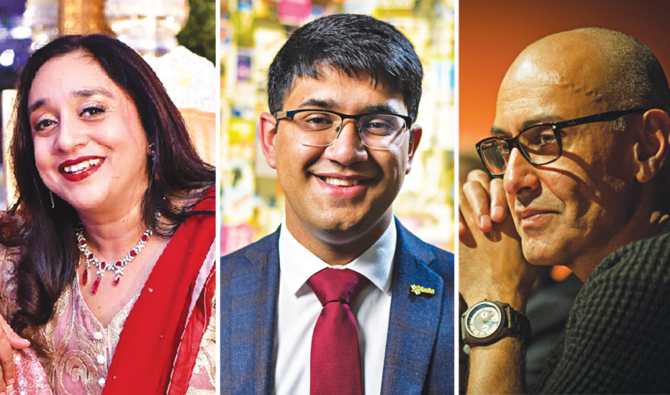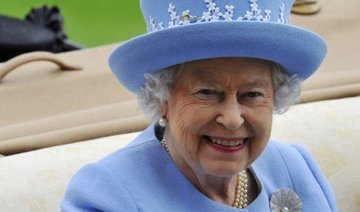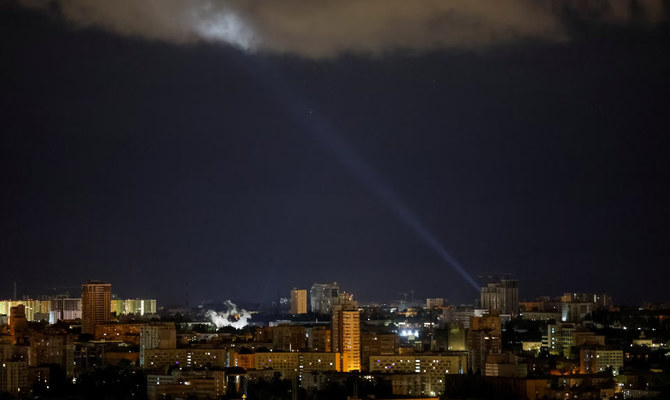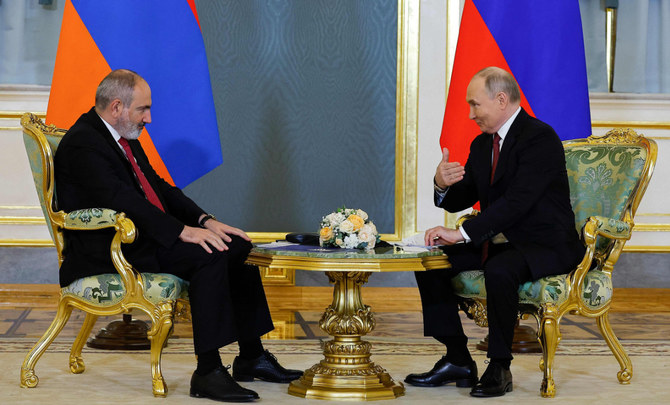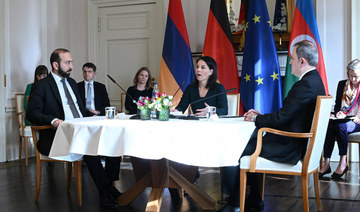LONDON: A record number of Muslims have been named in the Queen’s New Year Honors list for achievements ranging across technology, the arts, business and community work.
Among the 1,148 recipients recognized in the list are Aamer Naeem, CEO of the charity Penny Appeal; Nasar Mahmood, chairman of the British Muslim Heritage Center; and Supt. Umer Khan of Greater Manchester Police, who all received an Officer of Order of the British Empire (OBE) for community work.
Dr. Malik Ramadhan, head of the accident and emergency unit at the Royal London Hospital, who operated through the night on 12 victims of the London Bridge terror attack in June 2017, also received an OBE.
Abul Kalam Azad Choudhury, who founded the Azad Choudhury Academy and Welfare Trust, received a Master of the Order of the British Empire (MBE) for services to education in Bangladesh, and immigration officer Jahaid Ahmad received the same award for services to law and order.
Faeeza Vaid, 34, executive director of the Muslim Women’s Network, who four years ago helped to set up the charity’s helpline to assist women fleeing forced marriages or at risk of so-called “honor” violence, was also appointed an MBE.
“I call myself a Muslim feminist,” said Vaid. “My faith tells me I need to stand for equality and justice.”
Many people in their early 20s are still trying to decide what to do with their lives. Not Saeed Atcha.
At age 22, he is already CEO of his own magazine publishing venture, a trustee of several charities, a trainer, mentor and motivational speaker. The British government has also spotted his talent and, in November, he was appointed social mobility commissioner.
Now Atcha has become the youngest person named in the Queen’s New Year Honours list, receiving an MBE for services to young people in the Manchester region, where he has lived all
his life.
As is the custom, he was told about the award several weeks ago but was sworn to secrecy until the official announcement. “I am the worst person at keeping a secret, so I told my closest family and a couple of close friends — four people in all — and then put it to the back of my mind,” Atcha told Arab News.
“When I got the letter asking me if I would accept it, I thought it might be a joke. I didn’t realize you could refuse it. So I checked and realized this was real. You really don’t expect an honor like this, especially at my age. I was quite emotional about it.”
Atcha said that his faith had helped him through difficult times. The grandson of Indians who emigrated from India in the 1950s and settled near Manchester in northwest England, Atcha spent much of his childhood in foster care. His mother has a neurological condition that meant she was not always able to look after him.
He was only 2 when he first went into care. He was reunited with his mother when he was 5, but six years later went back into foster care with relatives.
By his own admission he was “a tearaway” as a teenager. “I didn’t have a criminal record, but I was not the easiest child,” he said.
His rebellious streak led him to start Xplode, a magazine for young people, after a teacher reprimanded him for focusing too much on the school magazine instead of studying for his GCSE exams.
“Instead of a school magazine, I decided I would produce a borough-wide magazine.”
He approached the assistant director of the local council to ask for office space and within a week was installed in an office in Bolton town center with support to source funding. He was 15.
“I’ve never been afraid to go to the top,” he said. Next he acquired funding and a business mentor from O2, the mobile network company.
Xplode is produced entirely by teenagers and young people for their own peer group. More than 7,500 copies are distributed to schools, colleges, supermarkets and coffee shops.
Atcha has since set up Employ, which has helped more than 5,000 young people improve their chances of finding employment.
He is also a trustee for three charitable organizations and is on the board of governors for his old school. Somehow he fits it all around studying for a master’s degree in public relations at Manchester Metropolitan University.
Atcha believes he carries a triple responsibility. “I’m young, I’m a Muslim and I come from a disadvantaged background. Muslims sometimes marginalize themselves. The idea that in one of the most advanced countries in the world, a young person can’t escape the path of disadvantage because of their postcode or their parents’ income or because they’ve been in care, offends me.”
Recently, Atcha attended the Misk Global Forum in Riyadh. “I’ve never been to a conference attended by 6,000 young people. If only I could return to Saudi Arabia more often. The government is really investing in young people there, which is essential for our future, as my personal journey shows.”
And those GCSE exams that his teacher was so worried about? Atcha passed them all. With flying colors.
Chaudhry was 21 when he fell in love with dance, which is on the late side if you want to make a career out of it. But he soon made up for lost time. At 58, he can look back on a career as a performer and manager that has taken him all over the world and culminated in an OBE for services to dance and dance production.
Muslims are not generally seen to have a strong tradition of dance, unlike poetry and literature. But Chaudhry said that his OBE is recognition of the wealth of talent in the Muslim world.
“It’s wonderful. It is a testament to how, despite all the paranoia and the negativity about the Muslim world and what it brings, it is such an important source of talent and it is making a difference to how we live our lives. It’s a big message because it shows that all the work on integration and celebrating diversity is bearing fruit.”
Chaudhry was born in Lahore, Pakistan, and was 3 when he came to Britain with his parents. His father had been a professor of mathematics in Pakistan, but had to take a job as a security guard, while his mother, who was from a wealthy family, worked on the assembly line at a bakery.
He was 17 when he was first captivated by a contemporary dance performance at the famous Sadler’s Wells theater in London. He had embarked on an English degree at the University of Sussex, but abandoned his studies in favor of a career in dancing.
Chaudhry enrolled at the London Contemporary Dance School, graduating in 1986, “which was quite late.” But he has worked consistently in opera and theater in Germany and Belgium as well as the UK.
After retiring from dancing in 1999, he completed a master’s degree in arts management. Eighteen years ago, he sold his apartment to raise cash to found the Akram Khan Company with dancer Akram Khan, a specialist in kathak, a north Indian dance style.
Alongside running the company, Chaudhry was also a creative producer for Chinese dancer Yang Liping and for the English National Ballet for four years.
He is delighted that so many Muslims have been honored. “It thrills me, actually. Every single person I’ve seen on that list has earned it. There hasn’t been any political correctness about wanting to ensure they get enough black and brown and Muslim faces. It’s a testament to the breadth and scope of the awards, and how they see value in a society.”
Malik is one of a rare, but growing, breed — a Muslim woman who is also a qualified fitness instructor.
The 51-year-old was the first, certainly in her locality if not the whole UK, when she qualified in 1995. Since then she has inspired other Muslim women to improve their health and reduce social isolation through exercise.
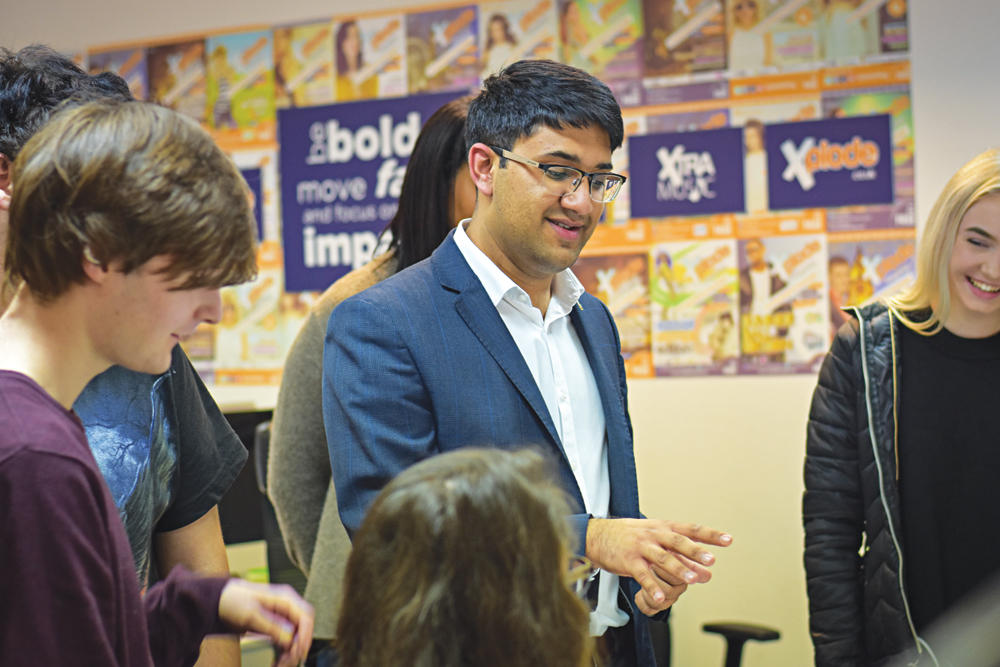
A trustee of several charities, a trainer, mentor and motivational speaker, Saeed Atcha is already CEO of his own magazine publishing venture
Malik also fundraises for a children’s hospice in her home city, Leeds, and four years ago established a charity, Give a Gift, to get British Asians involved in charitable work. Her efforts have been recognized with an MBE.
Malik, who was born to Pakistani immigrants, had an inkling that something was afoot when a letter arrived marked “Cabinet Office.” Her husband, Hanif, had received a similar one in 2016, telling him that he had been nominated for an OBE. Nevertheless, it still left her “shocked and overjoyed.”
The honoring of so many British Muslims was gratifying, she said. “When something appears in the media, it’s always related to extremism and we get linked with that. It’s fantastic for Muslims to be recognized for the good work they are doing.
“My faith is my first and foremost reason for what we’re doing. We do what we do to help anybody and everybody.”
As soon as she qualified as a fitness instructor in October 1995, Malik was approached to start fitness classes for Pakistani and Bangladeshi women in Leeds. Research showed they were at risk of developing chronic health problems, but social isolation, poor language skills and cultural tradition prevented them from taking exercise.
“I was given my first class within a week,” said Malik, who speaks Urdu and Punjabi. The classes took off and she has now helped more than 40 women from ethnic minorities go on to qualify as instructors.
Her charity work includes the Ramadan Toys Appeal. She has also raised more £100,000 for Martin House Children’s Hospice, which is used by more than a third of Muslims living in the West Yorkshire region of England.
In 2003, tragedy struck Malik’s own family when she was shot by a masked man who had broken into the family home. At the time, she was five months’ pregnant with her daughter, Hibah, having given birth to a stillborn son previously. Her attacker was never caught.
Fortunately, both she and Hibah survived the ordeal. “After losing one chid, she is my miracle baby,” said Malik.


